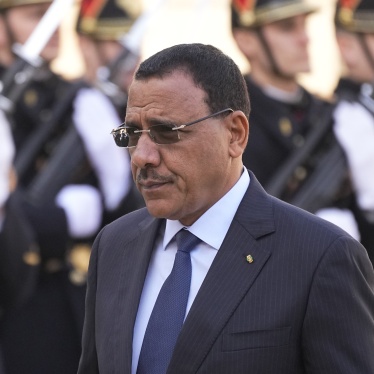(Manama) - At least 38 people were wounded when Bahraini security forces opened fire on protesters coming to pray near the Pearl Roundabout in Manama on February 18, 2011, Human Rights Watch said today. King Hamad, as commander of the Bahraini Defence Forces (BDF), should immediately order an end to attacks on peaceful protesters and the United States, the United Kingdom, and other international donors should immediately suspend military assistance to Bahrain, Human Rights Watch said.
Several patients at the Salmaniyya hospital told Human Rights Watch the army and police opened fire without warning on a crowd making their evening prayers near the heavily guarded roundabout. One protester said he was attacked by an armed man in civilian clothes.
The United States provided approximately US$20 million in military assistance to Bahrain in 2010, primarily for the purchase of military equipment, weapons, and training. It has proposed another US$20.2 million in assistance for 2011. It is unclear whether such equipment was used in today's attacks against the protesters.
"The doctors say there are 38 wounded so far, and three are in critical condition," said Anna Neistat, senior emergencies researcher, from Manama. "Security forces are compounding their abuses by preventing medical staff from reaching the scene to treat the wounded."
At least 10 witnesses, five of them patients, separately told Human Rights Watch that a large group of army and police, using military vehicles, attacked the crowd at around 5:50 p.m. as they prepared for evening prayers close to Pearl Roundabout, site of earlier protests that is now closed off by the security forces. The victims said the scene was peaceful and that there was no warning issued before the forces opened fire using teargas, rubber bullets, and live ammunition. They said the attack did not last long because people immediately started running away.
Two doctors told Human Rights Watch they had treated patients with what seemed to be injuries from live bullets rather than shotgun pellets, judging by the entry and exit holes. One had been shot in the back, most likely by a handgun, and another in the head.
Medical staff told Human Rights Watch they had sent at least 12 ambulances to the Pearl Roundabout area, but that the security forces were blocking access to some. Two paramedics told Human Rights Watch they were stopped by police and men in civilian clothes who said they would shoot them unless they turned the ambulance around. A senior paramedic called from the scene and told the hospital not to send any more ambulances because it was too dangerous, prompting hospital staff to stop dispatching crews.
Human Rights Watch urged the Bahraini authorities to let medical staff treat the injured and asked the government to immediately investigate reports that paramedics have been arrested at the scene.
The crowd had been attending the funerals for protesters killed and at around 5.30 p.m. began moving towards the roundabout. It appears that as the crowd neared the roadblocks set up by the security forces during the night/early morning of February 17, they opened fire.
Human Rights Watch heard gunfire shortly before 6:00 p.m., and had observed tanks and armored personnel carriers parked near the area before the attack, as well as helicopters moving overhead.
Thousands of people have gathered outside the hospital and people have formed a human chain around the building to try to maintain order inside and out.
Earlier in the day, France announced it had suspended exports of security equipment to Bahrain and Libya. On February 17 the UK government announced it was "reviewing" the export of arms to Bahrain.
"The Bahraini army has done what the Egyptian army did not do and exactly what the United States and its other partners urged it not to do - it has opened fire on its own people," said Tom Malinowski, Washington director at Human Rights Watch. "Donors cannot continue to provide aid to Bahrain's security forces as if this did not happen."







